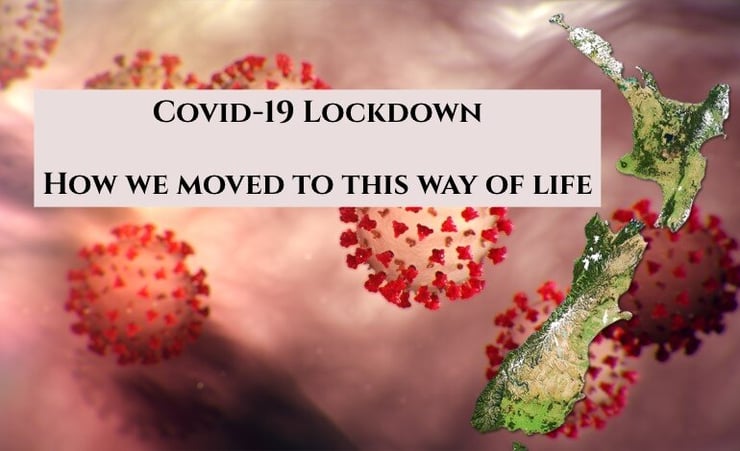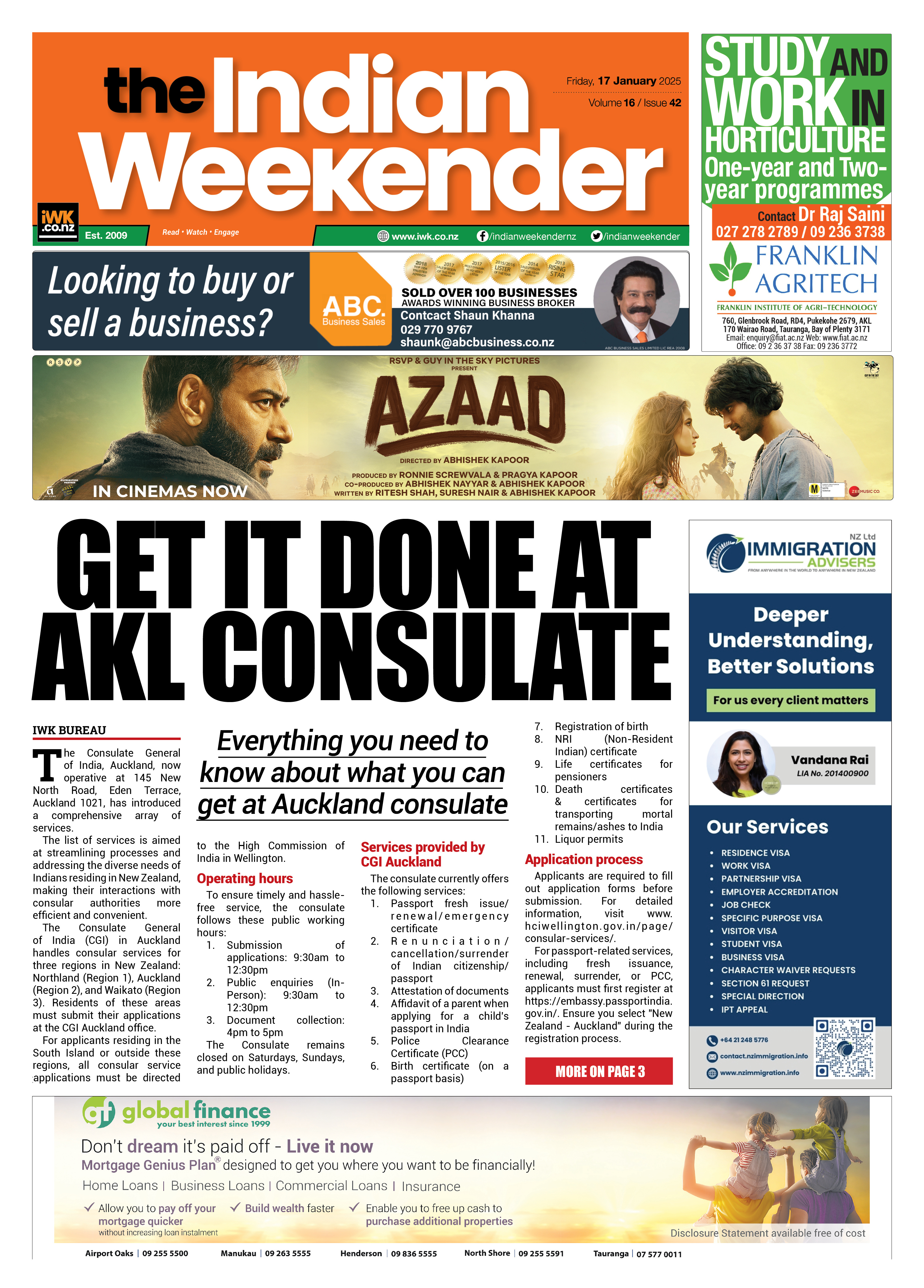Covid-19 Lockdown: A timeline of the rise of Covid-19 in New Zealand

New Zealand finally entered into complete lockdown on Wednesday, March 25, at 11:59 p.m. as a response to Level 4 of New Zealand's four-level COVID-19 alert system - culminating a five-day preparatory process started by Prime Minister Jacinda Ardern.
Ms Ardern had first announced the four-level Alert system in New Zealand's response to the Covid-19 epidemic in her direct address televised to the nation on Saturday, March 21, in what can safely be said as preparing the nation for the eventual complete lockdown at Level-4 as and when government authorities eventually decided to escalate it to the highest level.
Since then things moved progressively fast and just within a matter of two days on Monday, March 23, Prime Minister escalated the alert level-3 whereby urging the nation to restrict any unnecessary movements as a final preparation to enter into complete lockdown phase on Thursday, March 26, when the alert level would be escalated to the highest level-4.
Indeed, this was unprecedented, surreal, and without any incidence in the collective public memory of the nation, however, the only available recourse and widely agreed across various spectrum of health experts to negotiate the global pandemic.
Here is a chronological illustration of how the number of confirmed and probable cases of coronavirus infected people continued to rise, along with real threats of community transmission and eventually culminating into a complete countrywide lockdown.
Thursday, March 19
Prime Minister Jacinda Ardern announces New Zealand is closing its border to anyone, not a citizen or permanent resident of New Zealand. Exceptions to partner and young dependent child. Total cases confirmed in New Zealand, then, 28.
Friday, March 20: Ministry of Health confirms 11 new cases bringing a total to 39.
Saturday, March 21: Director-General of Health Dr Ashley Bloomfield confirms 14 new cases of Covid-19 bringing the total to 53 and four probable. Community Transmission not confirmed.
Saturday, March 21: PM announced 4 level alert system
Prime Minister announced a four-stage alert system for Covid-19, New Zealand with 53 cases and four probable at Level 2. New Zealanders asked to reduce contact in an escalation of efforts to reduce the spread of the virus in the country. With every elevation into the next level, restrictions in New Zealand to increase significantly leading to complete lockdown.
Restrictions:
-New Zealanders over the age of 70 and those with certain medical conditions told to stay at home as much as they can to reduce the risk of contact with the virus.
-Workplaces to implement plans to reduce person-to-person contact, including work from home where possible
-Limit all non-essential domestic travel
Sunday, March 22: Dr Ashley Bloomfield addressing the media announced 14 new cases in New Zealand, bringing the total to 67. All 14 new cases taken into self-isolation and close contacts of the patients identified and asked to self-isolate.
Monday, March 23: Dr Ashley Bloomfield announced 36 new confirmed cases of Covid-19 in New Zealand. The country now stands at the figure of 102 where more than half are identified as overseas travellers. 7400 tests done so far with 1100-1500 tests done every day now. The Ministry of Health's new team now to do contact-tracing at least 50 cases a day.
Monday, March 23: Prime Minister escalates Covid-19 epidemic in New Zealand to Alert Level-3
With 102 cases in New Zealand, the Prime Minister announces the country climbing into Level 3 of the four-stage alert system and to move on to level-4 on Thursday, 12 a.m., March 26. This 48-hours window announced on Monday afternoon was to give the time required to ensure essential services are in place as the country hence goes into lockdown at the strike of midnight on Thursday.
This lockdown continues for four weeks and can be extended if the spread of the virus does not come under control.
Lockdown now means all non-essential services to close down for four weeks, schools to shut down with limited travelling opportunities. Essential Services Pharmacies, doctors, supermarkets, service stations to remain open during the lockdown along with essential banking services and non-essential services such as cafes, bars, restaurants, cinemas etc. to be shut down. All public venues to closedown too.
The Prime Minister said people could leave their home for fresh air and exercise, but it must be solitary, and people should only spend time with people they are in self-isolation with.
Public transport available to people working in essential services enterprises only.
Level 3 Restrictions (Monday, March 23- Wednesday, March 25):
• Travel in areas with clusters or community transmission limited
• Affected educational facilities closed
• Gatherings cancelled
• Public venues closed (e.g. libraries, museums, cinemas, food courts, gyms, pools, amusement parks)
• Alternative ways of working required and non-essential businesses should close
• Non-face-to-face primary care consultations
• Non-acute (elective) services and procedures in hospitals deferred and healthcare staff reprioritized
List of at-risk people announced:
• People over the age of 70
• People with medical conditions
• People undergoing treatment for cancer and blood conditions
• Pregnant women
• People without easy access to healthcare
Tuesday, March 24: Government allocates $330 million to keep air freight moving and ensure New Zealanders retain access to essential goods during the four-week level 4 lockdown. Minister of Transport, Phil Twyford says this was allocated from the $600 million set aside for the aviation sector as part of the $12.1 billion COVID-19 support package.
Tuesday, March 24: Director-General of Health Dr Ashley Bloomfield confirms 40 new cases and a number of probable cases of Covid-19 in New Zealand bringing the total to 155. Overseas travel is still the biggest driver of Covid-19 infections. 4 Community Transmission confirmed in the latest number of 40 cases, three in Auckland and one in Wairarapa. The Ministry of Health announces 12 people recovered from the virus. MoH conducted 8300 tests done so far.
The Ministry of Social Development is moving its services to phone and online-only as Work and Income offices prepare to close during the lockdown.
Tuesday, March 24: Immigration New Zealand issues an Epidemic Management Notice to temporary visa holders living in New Zealand.
Visa expiring before April 1, 2020: Must apply for a new visa, the interim visa will be issued. (Student, interim, work, visitor and limited visa holders included).
Visa expiring between April 1 and July 9, 2020: Visas will automatically be extended to late September. Confirmation of extensions will be sent. Everyone arriving in New Zealand needs to be isolated for 14 days. Enforcement applies to violators.
Tuesday, March 24: New Zealanders overseas told the window to return home amid coronavirus 'almost completely closed'. "If you're a New Zealander and still overseas - stay where you are," Foreign Minister Winston Peters says.
Tuesday, March 24: Government announces mortgage holiday and business finance support schemes. The package will include a six-month principal and interest payment holiday for mortgage holders and SME customers whose incomes have been affected by the economic disruption from COVID-19.
The Government and the banks will implement a $6.25 billion Business Finance Guarantee Scheme for small and medium-sized businesses, to protect jobs and support the economy through this unprecedented time.
Tuesday, March 24: Prime Minister Jacinda Ardern in her media conference, addresses the nation to stay home to save lives.
"Anybody who is not an essential worker but tries to go to work during the alert level four lockdown, is "literally putting people at risk", said the Prime Minister. Only essential workers to go out for work, rest asked to stay home during the four-week lockdown.
Tuesday, March 24: Parliament to adjourn for almost five weeks as the country goes into lockdown
Tuesday, March 24: Deadline for domestic travel extended: Government extends domestic travel deadline till Friday midnight, March 27 as the country goes two-days into lockdown standing at Level 4.
Tuesday, March 24: Government announces the final list of essential workers and essential businesses that can be operational during the lockdown.
Dairy stores can continue to operate but must observe strict physical distancing rules for customers. Dairies stores provide basic food items like bread and milk to people close to where they live, especially the elderly who may not be able to get to a supermarket. Warehouse to remain closed during the lockdown. Liquor stores closed, unless within a Licensing Trust Area and with "one-in one-out" rule.
Wednesday, March 25: Police appeal for the public to use 111 for emergency or life-threatening situations only.
Wednesday, March 25: Temples, Gurudwaras, and mosques to close down during the lockdown period completely. Temples and gurudwaras go digital and will stream live any prayer it conducts on its Facebook page.
Wednesday, March 25: Director-General of Health Dr Ashley Bloomfield announced another 50 cases confirmed bringing the total to 205. Dr Bloomfield adds that 9780 tests have been carried so far. Five of the confirmed cases came from Marist School in Mt Albert suburb of Auckland. School closed and all staff taken into isolation.
Wednesday, March 25: At 12:21 p.m. Civil Defence Emergency Management Director-General Sarah Stuart-Black declares a State of Emergency or National Emergency in New Zealand. 6:30 p.m., New Zealanders receive 'National Emergency Management Agency Alert'.
Wednesday, March 25: Police Commissioner Mike Bush said Police is ready to arrest non-compliant during the lockdown. He further added that the Police have the power to order any person to stop any activity that contributes to the spread of the virus and can call on the military for support.
Wednesday, March 25: Rent increase freeze and more protection for tenants during lockdown. Housing Minister Megan Woods announced balanced changes in tenancy so that both tenants and landlord do not suffer during the unprecedented lockdown.
· An immediate freeze on rent increases
• Tenancies will not be terminated during the lockdown period, unless the parties agree, or in limited circumstances
• Tenants who had previously given notice can stay in there if they need to stay in the tenancy during the lockdown period
• Tenants will still be able to terminate their tenancy as normal if they wish
Thursday, March 25, 11.59 P.M. NEW ZEALAND GOES INTO LOCKDOWN
New Zealand witnesses deserted and eerie roads on the first day of national lockdown.
The Ministry of Health announced further 78 cases detected with Covid-19 infection in New Zealand bringing the total infected figure in New Zealand to 283. The 78 cases include 73 are confirmed and 5 probables. As of Thursday, Dr Ashley Bloomfield also announced that 27 patients so far have recovered from the virus. The total number of checks done till date is 12,683, of which 2417 tests were done on Wednesday, March 25.
Dr Bloomfield announces Pharmacists will have to limit all funded drugs to one month's supply, or three months' supply for oral contraceptives. Police Commissioner Mike Bush said those returning to New Zealand from overseas today without a plan for isolation have been met by numerous officials - such as customs and Police - then triaged to locations for self-isolation.
Prime Minister Jacinda announces the Government releasing $27 million for NGOs, social service sectors and community groups to continue providing essential services.
PM Ardern announces parliament adjourned until April 28 and a special select committee formed chaired by Opposition leader Simon Bridges.
Friday, March 27:
Dr Ashley Bloomfield announced further 85 cases confirmed in New Zealand including the probable cases making the total to 368. The good news, 37 patients have recovered so far and one patient is in Intensive Care Unit (ICU). Those who have recovered from Covid-19 are signed off by a health official after being symptom free for a 14 day period. More than 2500 retired health workers have signed up to help with the Covid-19 response.
Covid-19 cases rose from 28 to 368 in nine days since Prime Minister Jacinda Ardern first announced New Zealand will close its borders on Thursday, March 19.



